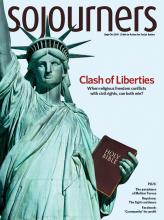THIS MONTH'S LECTIONARY includes very familiar texts, such as Psalm 23 and the command to love one’s neighbor as oneself. With these passages comes an opportunity to read them from a fresh perspective. It is tempting to read individual verses with reference to ourselves and our contemporary circumstances; indeed, that is the only way some read the texts. However, the cyclic nature of the lectionary provides regular opportunities to engage these texts from different perspectives.
October marks the 500th anniversary of the Protestant Reformation, which revolutionized the way many people gained access to the biblical texts, newly translated out of Latin and into their own language. The Reformation put a high value on a believer’s access to the scriptures, which is now easy to take for granted. The translations produced during the period of the Reformation signified a deeper journey into the scriptures – and not just for scholars.
Bearing this in mind, what might reading more deeply look like for those who are not biblical scholars? Most if not all of these texts were composed to be read aloud. These texts often “read” quite differently when heard aloud. Perhaps the most important question we can ask of a text is how it was understood in its originating context, recognizing the differences between our world and the worlds of the Bible. Lastly, it is essential to ask how the message of a particular passage functions in our world, particularly when some of its framework reflects values we no longer share.
Read the Full Article

